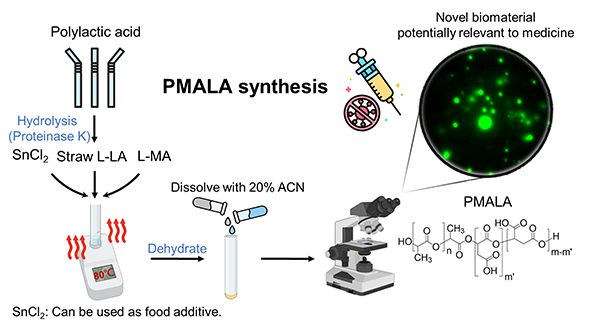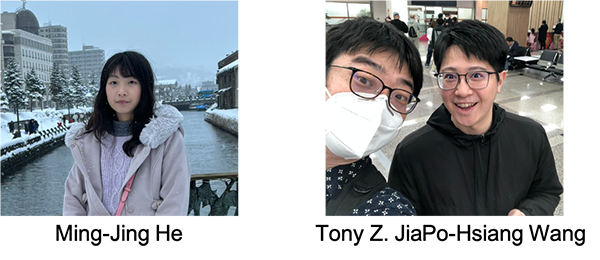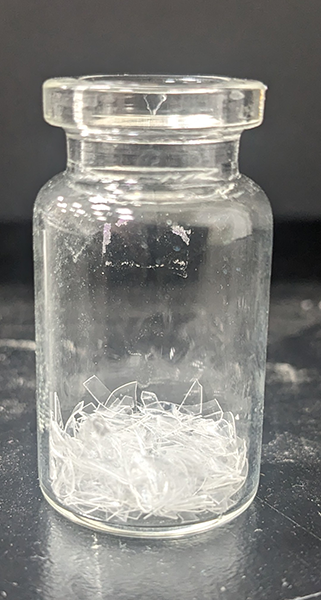A collaborative study led by researchers at ELSI and National Central University in Taiwan discovered a method to convert plastic straw waste into polyester microdroplets potentially useful for drug delivery methods. This novel biorecycling method combines enzyme engineering and prebiotic chemistry, first converting polylactic acid straws into lactic acid monomers through enzymatic activity, followed by addition of malic acid and subsequent polymerization into poly(malate-co-lactate) through dehydration synthesis.

Non-reusable plastics are a major source of waste around the world, and new methods to recycle this waste into useful materials are a major focus of current research in fields focusing on biorecycling and green chemistry. One type of plastic commonly used in society is polylactic acid, which is used mainly due to its biodegradability and synthetic facility. It also turns out that polylactic acid is also a plausible polymer on early Earth! In fact, polylactic acid is believed to have been formed on early Earth through simple heating and drying of lactic acid, a monomer commonly found in meteorites or other primitive reaction product mixtures. These prebiotically synthesised polylactic acid polymers have in fact been shown to assemble into membraneless droplets, proposed to be protocell models, upon rehydration; polyester droplets of certain composition have even been used in modern drug delivery applications! Thus, polylactic acid appears to be a key molecule connecting modern biology with prebiotic chemistry.
“How can we use the lessons that we learned from prebiotic chemistry to help with biorecycling?” you may ask. Well, prebiotic chemistry is mostly aqueous, and since it’s possible to produce polyester microdroplets from lactic acid monomers, if we can somehow convert polylactic acid in straw waste into lactic acid monomers, then it could be possible to then subsequently produce polyester microdroplets from straw waste! The labs of Assistant Professor Po-Hsiang Wang of National Central University (NCU), experts in biochemistry and bioengineering, and ELSI’s Specially Appointed Associate Professor Tony Z. Jia, experts in prebiotic chemistry and biophysics, thus sought to demonstrate the plausibility of converting unusable plastic straw waste into droplets that could be relevant to biomedicine.
Thus, former Master’s student Ming-Jing He (NCU) began work on this project as the main experimental lead through a support grant by the ELSI Research Exchange Programme for collaborative research. First, plastic straw waste was successfully hydrolyzed into lactic acid monomers through two different methods: high-temperature alkaline reactions and proteinase K enzymatic activity. Both techniques appeared to result in fairly good product yields, but the proteinase K strategy was chosen as the conditions required for the high-temperature alkaline reactions were considered too harsh and not “green” enough. Following acquisition of straw waste-origin lactic acid monomers, He then added malic acid, another prebiotically plausible monomer, and subjected the mixture to dehydration synthesis over a few days to acquire poly-lactate-co-malate (PMALA) gels; these gels could then be assembled into membraneless PMALA droplets upon rehydration. While the PMALA synthesis reaction itself did not require a catalyst to push the reaction forward, a minimal amount of tin chloride was added to speed up the reaction slightly.
“The entire process of converting polylactic acid straw waste to lactic acid monomers, and then to PMALA droplets (after addition of malic acid) could be scaled up, suggesting that with more optimization, the proof-of-concept demonstration shown in this study could be applied commercially,” says Wang, who will moving to the Singapore Institute of Food and Biotechnology Innovation (SIFBI), Agency of Science, Technology, and Research (A*STAR) in April, 2025.
Jia adds, “as prebiotic chemistry is inherently green, often utilising aqueous-based chemistries, more and more collaborations between green chemists and prebiotic chemists could lead to more interesting studies and development of novel biorecycling techniques!”
We note that the ELSI Research Exchange Programme no longer supports visits by Master’s course students to ELSI from fiscal year 2024. As He had graduated by the time the manuscript was submitted, Master’s student Kun-Ti Liao (NCU) completed instrumental final experiments to push this manuscript over the finish line.


| Journal | ACS Applied Polymer Materials |
| Title of the paper | Low-temperature green synthesis and assembly of poly(malate-co-lactate) gel-based microdroplets from polylactate plastic straw waste |
| Authors | Po-Hsiang Wang1,2,3,†,*, Ming-Jing He1,†, Ruiqin Yi4, Rehana Afrin5, Kun-Ti Liao2,3, Wen-Chi Yu1, Shota Nishikawa5, Mahendran Sithamparam6, Chen Chen7, Kosuke Fujishima5,8,9, Kuhan Chandru6,10,11, and Tony Z. Jia3,5,* |
| Affiliations |
†These authors contributed equally |
| DOI | 10.1021/acsapm.4c03955 |
| Online published date | 1 April 2025 |
